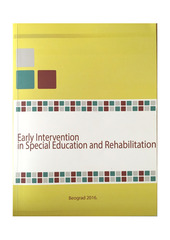Приказ основних података о документу
Preconditions of mathematics knowledge and skills
| dc.contributor | Nikolić Snežana | |
| dc.contributor | Nikić Radmila | |
| dc.contributor | Ilanković Vera | |
| dc.creator | Buha, Nataša | |
| dc.creator | Gligorović, Milica | |
| dc.date.accessioned | 2021-06-17T13:18:33Z | |
| dc.date.available | 2021-06-17T13:18:33Z | |
| dc.date.issued | 2016 | |
| dc.identifier.isbn | 978-86-6203-086-3 | |
| dc.identifier.uri | http://rfasper.fasper.bg.ac.rs/handle/123456789/2437 | |
| dc.description.abstract | The main aim of this research is to determine developmental abilities that are preconditions of acquiring mathematics knowledge and skills. The sample consisted of 115 typically developing children of both genders, aged between 8 and 11 (M=9.78). Acadia test of developmental abilities was applied to assess the abilities that are considered necessary for acquiring academic knowledge and skills. Achievements in different areas of Mathematics were assessed on the basis of teachers’ questionnaire based on General achievement standards. The results of this research reveal a statistically significant influence of various developmental abilities, assessed by means of Acadia test, on achievements in different areas of Mathematics, presented through total scores: visuomotor skills (p≤0.000-0.003), perceptive functions (p=0.033-0.018), language skills (p=0.004-0.020), verbal and nonverbal reasoning (p=0.002; p=0.023) and auditory short-term memory (p=0.015). Children with lower scores on Visuomotor Coordination and Sequencing subtest (below 25th percentile) had significantly lower achievement in all mathematics areas (p≤0.000-0.039). Children with lower scores on Visual Discrimination subtest had significantly lower achievement in the area of multiplication and division (p=0.003- 0.010), geometry (p=0.002-0.036) and measurements and measures (p=0.009-0.016). Lower copying skills (below 25th percentile) were related to lower addition and subtraction achievements (p=0.012-0.046), while lower scores on Auditory Memory subtest were related to lower knowledge of integers (p=0.017-0.029). Children with lower scores on Concept Formation subtest had lower achievements in the areas of addition and subtraction (p=0.009-0.011), multiplication and division (p=0.002), geometry (p=0.017- 0.045) and measurements and measures (p=0.013-0.009). The results obtained in this study indicate that among numerous developmental abilities, visuomotor coordination, visual discrimination, copying skills, verbal reasoning and auditory short-term memory can be singled out as areas of great importance for the development of various aspects of mathematics. Thus, in the context of prevention and early intervention, it would be desirable to focus more on the development of visuomotor and integrative skills at the preschool level. | |
| dc.language | en | |
| dc.publisher | University of Belgrade, Faculty of Special Education and Rehabilitation, Serbia / Univerzitet u Beogradu – Fakultet za specijalnu edukaciju i rehabilitaciju | |
| dc.rights | openAccess | |
| dc.rights.uri | https://creativecommons.org/licenses/by-sa/4.0/ | |
| dc.source | Thematic Collection of International Importance- Early Intervention in Special Education and Rehabilitation“, Beograd, Srbija, 2016. | |
| dc.subject | developmental abilities | |
| dc.subject | mathematics | |
| dc.subject | Acadia test | |
| dc.title | Preconditions of mathematics knowledge and skills | en |
| dc.type | conferenceObject | |
| dc.rights.license | BY-SA | |
| dc.citation.epage | 396 | |
| dc.citation.other | : 375-396 | |
| dc.citation.rank | M14 | |
| dc.citation.spage | 375 | |
| dc.identifier.fulltext | http://rfasper.fasper.bg.ac.rs/bitstream/id/6290/Untitled27.pdf | |
| dc.identifier.rcub | https://hdl.handle.net/21.15107/rcub_rfasper_2437 | |
| dc.type.version | publishedVersion |


